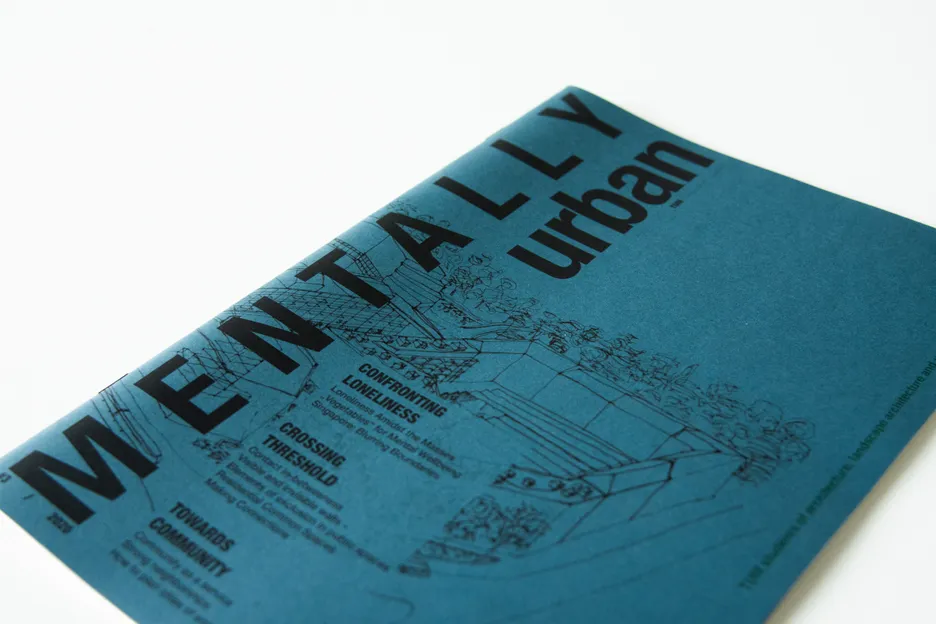Mentally Urban Issue #3
Magazin

Research in the spatial disciplines occupied different epistemological locations and produces knowledge that is framed in different ways. As a consequence, it cannot be assumed to be self-evident or a pre-given process. However, rather than perceiving the lack of certainty as an obstacle to research, we can take it as an epistemological and conceptual resource to work with, based on the understanding that urban issues cannot be grasped in isolation and from a single perspective. Accordingly, the research, practical and design work conducted in this field is increasingly seen as a ‘transdisciplinary’activity, which moves beyond the confines of the single discipline, or the interdisciplinarity of different disciplines. This approach to research decidedly integrates actors from non-university contexts and aims to produce outcomes with social relevance.
The joint work on this magazine provides students in architecture and urbanism with the possibility to explore areas which intersect with other disciplines, develop new ideas, change perceptions, engage with others, and critically reflect on architecture and urbanism.
We believe that this is pre-requisite for the developing of a better understanding of the complex and often contradictory processes that shape our urban environments and cities, as well as the controversies that emerge from them and are in this sense of broader concern. The insights gained in this way are meant to inform and, perhaps, challenge the student‘s own work as designers and help them to further develop their own interests and agendas. The conceptual dichotomy of contact/no contact, or connected/disconnected can be used for the drawing of comparisons between different spaces and spatial practices. Historically, we see
how cities and the built environment have constantly shifted their positioning between the two poles, a phenomenon that is, perhaps, even more evident in shifting social practices, politics, or economical arrangements. Problems of inequality and exclusion are often, but not always, accompanied by spatial disconnectedness, separation and isolation.
The topic of „contact“ is closely related to the making of connections. Most obviously, this includes connections between human beings, but also between humans and non-humans like institutions, legislation, ideas, or the spatial arrangements that pre-structure everyday actions. In our everyday lives we experience environments in which we may establish new connections more easily than in others, and we notice that there are differences in ‘connecting ourselves’ to a given space or environment. The making, or un-making of contacts and connections is an essential part of our social lives and in this sense influences our psychological state and well-being. Not all contacts are of the positive kind and wanted; sometimes we have to cross a threshold to establish new contacts; contacts can be risky, rewarding, or superfluous and ephemeral. The current crisis has revealed the multiple questions and the complexity in the making, or un-making of contacts and the previous issue of the magazine is dedicated to this field.
The contributions in this issue are focussed on three broadly conceived areas – confronting loneliness, crossing the threshold, and towards community. The authors explore different formats, modes of enquiry and presentation as part of their engagement with their cho- sen field of interest. The diversity of contributions demonstrates that multiple connections from within the spatial and design related disciplines can be made and that it is a rewarding undertaking to shed light on existing and new connections/disconnections. It is, at the same time, a very challenging task, because it inevitably involves leaving behind the comfort zones of the disciplines. Like in the field of design, there is always the possibility of meeting criticism and different opinions. This is why we think it essential to maintain a lively discourse about spatial issues and all the other questions that are related to them. A magazine seems to be perfectly suited to engage in debates and to share different positions with each other.
Norbert Kling and
Dorothee Rummel
Munich, July 2020
for further information please contact:
Dr.-Ing. Dorothee Rummel
Tel. +49 89 289 22343
PDF download
Magazin 'Mentaly Urban' Issue #3
Mehr Informationen